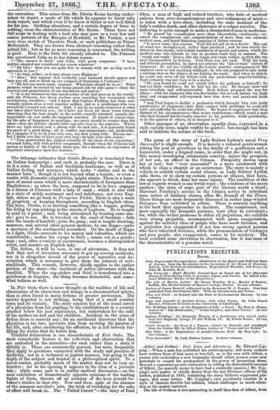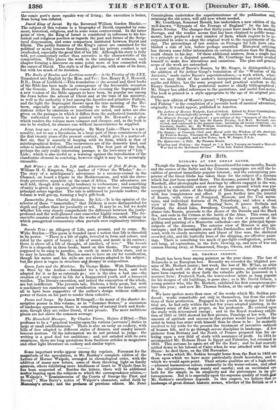PUBLICATIONS RECEIVED.
Boors.
State Papers and cbrreeponience- illustrative of the Social and .POlitical litafe of Europe, from the Revolution to the Accession of, the House of Hanover. Edited, with Historical Introduition, Biografildeid Menioirs; and Notes, by John M. Memble,-IrLA Wei lang_erin-: .:Eight Months' Journal kept on hoard one of -her lictiestes Sloops. of warAumng visits to Loochoo, Japan, and Pootoo., By Alfred Lau-
, • rence 'Master of the Royal Navy. The Life of Martin Luther. By Henry Woraley, M.A., Hee' tor of Easton, Suffolk, late Michel Scholar of Queen's College, Oxford. In two volumes. Letters'', f Janice Boswell, addressed to the Reverend W. .1. Temple. Now Mirt published from the Original MSS. With an Introduction and Notes. • : Time and Faith : an Inquiry into the Data of Ecclesiastical History. • In two volumes.
Lays and Legends of Ancient Greece, with other Poems. By John Stuart Blackie, Professor of Greek in. the University of Edinburgh. • . The Wedding Guests ; or the Happiness of Life; a Novel. By Mary C. Hume, Author of " The Bridesmaid," "Count Stephen, and other Poems." In twe
volumes. .
Sydney Fielding : the Domestic. History of a Gentleman who served under their late Majesties George IV and William IV. By Edwin Keene. In two volumes.
Giulio Bronchi : the Story of a Tuscan, related by Himself, and translated
finni the Italian Md. by Alfred Elwes, Author of "Ocean and her Rulers."' Fair Oaks; or the ExperienCes of Arnold Osborne, M.P. By Max Lyle. In two volumes. - Very Successful I By Lady Bulwer Lytton. In three volumes.
Alfieri and Goldoni : their lives and Adventures. By Edward 04- ping.—When a man has published his autobiography, and many authors have written lives of him more or less full, as is_ the case with Alfieri, a person who undertakes anew biography-should either possess some new materials or exceed his predecessors" ill- the power of presenting thew. Beyond a somewhat greater elaboration in telling the discreditable amours of Alfieri, (he scarcely seems to have had a creditable passion ) Mr. Cop- ping's new matter is chiefly drawn from the last Florence edition of firs author, published in 1853, containing the many hitherto suppressed part. sages, and some letters. Mx." Copping's own peculiarity consists in a style of rhetoric forcible but inflated, which challenges as much atten- tion as the mattes. narrated.
The life of Goldoni is less interesting in itself than that of Alfieri, frOns the comic poet's more equable way of living; the execution is better, from being less inflated.
David Xing of Israel. By the Reverend William Garden Blackie.— The subject of this volume is a biography of David, expanded by com- ment, historical, religious, and in some sense controversial. In the latter point of view, the King of Israel is considered in reference to his his- torical and religious position as regards the past and future of the Scrip- tural dispensation, and some comparison instituted between David and Christ. The public features of the King's career are examined for the political or moral lessons they furnish; and his private conduct is not overlooked, especially the great blot of his life. Although his story is fully told, yet commentary rather than narrative is the characteristic of the composition. This places the work in the catalogue of sermons, each chapter forming a discourse on some point more or less connected with the career of David. The style is of the platform, with some of its force, but with too much of its iteration.
The Books of Exodus and Leviticus accordin7 to the Version of the LXX. Translated into English by the lion. and Very Rev. Henry E. J. Howard, D.D., Dean of Lichfield.—This translation of the second and third books of the Bible has been made in consequence of the favourable reception of the Genesis. Dean Howard's reason for choosing the Septuagint for a new version of the Bible appears to have been, its popular use among the Jews before the advent of Christ and at the time of his ministry, as well as the authority it had among the Apostles and primitive Fathers, and the light the Septuagint throws upon the true meaning of the He- brew, especially in prophecies relating to the Messiah. The va- riations either by omissions or insertions are noted, and notes are also given on the passages in which it differs from the authorized translation. The authorized version is not printed with Dr. Howard's; a plan which renders the volume more compact and cheaper, and, as the book is one to be studied, its absence can without inconvenience be supplied.
long, long ago : an Autobiography. By Mary Lisle.—There is a per- • solidity, not to say a literalness, in a large part of these reminiscences of the first twenty years of the present century, which give it a matter-of- fact air, that is scarcely in keeping with its form, which is that of autobiographical fiction. The occurrences are of the domestic kind, and relate to incidents of childhood and youth. The best part of the book, .perhaps the only really interesting passage, is the love-story of "Lily" Lisle ; which is also useful as a warning against the introduction of the clandestine element in courtship, however slight it may be, or seemingly excusable.
Salt Water; or the Sea Life and Adventures of Neil D' Arty. By William H. G. Kingston, Esq., Author of "Peter the Whaler," &c.— The story of a midshipman's adventures in a revenue-cruiser in the Channel, on board a frigate in the Mediterranean, and with the slave- trade preventive squadron on the coast of Africa. The adventures are well told, though with a slight tendency to verboseness ; and something of unity is given to separate adventures by more or less connecting the principal agora together. The tale is addressed to juvenile readers ; the -volume is well got-up, forming a boy's gift-book.
Immortelles from Charles Dickens. By Ich.—It is the opinion of the selector of these " immortelles," that Dickens is more dm' tuiguished for depth and pathos than for jocularity or wit. It may be so, but we doubt whether Ich very clearly comprehends the difference between the justly- profound and the well-phrased cant somewhat highly seasoned. The Im- mortelles consists of extracts from the works of Dickens, with settings in which panegyrical commentary often prevails over explanatory introduc- ion.
Bernie Trie : an Allegory of Life, past, present, and to come. By Wyke Bayliss.—This poem is founded upon a notion that life is threefold in its power. "There is a life of sight, revealed in form and colour, and ruled by the spirit of beauty ; a life of sound, and music is its essence ; there is above all a life of thought, of intellect, of love." The &ecula Tria is a rhapsody in three books, based on this theme. The songs are supposed to be sung in paradise, on earth in man's fallen state, and as he may be hereafter. Mr. Bayliss seems to have an ear for versification, though his metre and his style are not always adapted to his subject; but the piece is vague in structure an# dreamy in composition. Queen Leta and the Mistletoe. By George Heise. With Illustrations on Steel by the Author.—Intended for a Christmas book, and well adapted for it so far as externals go' nor is the idea a bad one—the creation of a new object in life for a disappointed youth and a bereaved maiden. The literary execution, and indeed the conception of the whole, are but indifferent. The juvenile tale, Dickens, a fairy poem, but with a machinery too cumbrous and versification somewhat too heavy, seem all to have been suggestive of the author's _design without sufficient power of fusion on his part to render them cohesive.
Poems and Songs. By James Id‘Dougall.—In many of the shorter de- scriptive poems in this volume, as in " Summer Scenes," a succession of landscape appearances, there is something of natural truth and fresh- ness, though they are rather literal, if not prosaic. The more ambitious pieces are not above the common average.
The Household Manager. By Charles Pierce, Maitre d'il8te1.—This professes to be a "practical treatise upon the various [servants' duties in large or small establishments." There is also an essay on cook.ery, with bills of fare adapted to different styles of dinners, and sundry miscel- laneous matters. Of the information we do not pretend to judge : the writing is a good deal too -ambitious ; and, not satisfied with its own smartness,, there are long quotations from facetious articles in magazines and other light literature on cookery and similar topics.
Some important works appear among the reprints. Foremost for the magnitude of the speculation, is Mr. Bentley's complete edition of the Letters of Horace Walpole, arranged in chronological order' with.the
addition of many new some of them throwing light on family quarrels, others exhibiting more kindliness of heart in Walpole than he has been suspected of. Besides the letters, there will be additional matter bearing upon the subjects to which the correspondence relates,— as Walpole's Reminiscences of the Courts of George the First and Second" ; Miss Berry's notice of Walpole's character, called forth by Macaulay's attack; and the prefaces. of previous editors. Mr. Peter Cunningham undertakes the superintendence of the publication and, retaining the old notes, will add new where needed.
Mr. Courthope, Somerset Herald, has undertaken a new edition of the well-known "Synopsis of the Peerage of England" by the late Sir Harris Nicolas. The changes that thirty years have made in the modern Peerage, and the readier access that has been obtained to public muni- ments, have produced a vast number of facts, which require to be in- corporated in order to adapt the original work to the requirements of the day. The proceedings of last session on Peerages for Life have esta- blished a rule of law, before perhaps unsettled. Historical criticism has thrown some fuller information on certain questions than Sir Harris could obtain in.his day. Of these additional matters, from a single fact to a principle or a. disputed question, Mr. Courthope has freely availed himself to make free alterations and omissions. The plan and general scope of the work are untouched. A new edition of Bacon's Essays, by Mr. Singer, is distinguished by the addition of Sir Arthur Gorge's translation of the " Wisdom of the Ancients," made under Bacon's superintendence,—a work which, what- ever we may think of the author's interpretation of ancient classical myths and fables, has the same pregnant and practical wisdom as the Essays themselves. The prefatorial matter is chiefly bibliographical ; Mr. Singer has added references to the quotations, and useful foot-notes, The book is printed in a style appropriate to the age of its original pro- duction.
The new edition of Moore's (prose) "Epicurean" is neat. "Whaling and Fishing" is the completion of a juvenile book of nautical adventure, originally, it would appear, published. in America.
The Letters of Horace Walpole, Earl of Orford. Edited by Peter Cunningham, Now first chronologically arranged. In eight volumes. Volume I.
The Historic Peerage of England : a new edition of the " Synopsis of the Peer- age of England,' by the late Sir Harris Nicolas, G.C.M.G. Revised, cor- rected, and continued to the present time, including all recent creations, ex- tinctions, deaths, ha. By William Courthope, Esq., Somerset Herald ; of the Middle Temple, Barrister-at-law.
The Essays; or Counsels Civil and Moral with the Wisdom of the Ancients. By Francis Bacon, Viscount St. Alban. Revised from the early copies. The References supplied, and a few Notes, by S. W. Singer, F.S.A.
The Epicurean: a Tale. By Thomas Moore.
Whaling and Fishing : the Sequel to " A Boy's Voyages on board a Man-of-
War and in the Merchant Service." With four Tinted Illustrations.



























 Previous page
Previous page